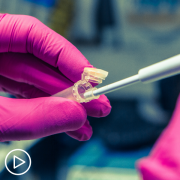An Expert Review of Emerging Metastatic Breast Cancer Research
An Expert Review of Emerging Metastatic Breast Cancer Research from Patient Empowerment Network on Vimeo.
What’s the latest in metastatic breast cancer (MBC) research? Expert Dr. Sarah Sammons shares an overview of emerging treatment options and how they could be utilized in MBC care.
Dr. Sarah Sammons is an oncologist at Duke Cancer Institute and Assistant Professor of Medicine at Duke University School of Medicine. Learn more about Dr. Sammons here.
See More From INSIST! Metastatic Breast Cancer
Related Resources:
Transcript:
Katherine:
When it comes to metastatic breast cancer research and emerging treatment options, what are you excited about specifically?
Dr. Sammons:
That’s a really good question. I think, right now, I’m very interested in a class of drugs called antibody drug conjugates.
What antibody drug conjugates are – they take a monoclonal antibody, which is – most patients have heard of Herceptin. So, Herceptin is an antibody which goes in and targets HER2. But that antibody is actually linked to a payload of chemotherapy cells. But instead of just – regular chemotherapy we inject that chemotherapy into the veins, it goes all throughout the body, it can be fairly toxic.
Antibody drug conjugates specifically find the cells that have that biomarker, like HER2, or TROP2, or HER3, and they find that cell, and they don’t release their chemotherapy until they’re taken up by that cell. So, it’s more a targeted, focused chemotherapy.
There is an antibody drug conjugate in HER2-positive breast cancer called Enhertu, or trastuzumab deruxtecan, which is – has been shown to have excellent efficacy in very heavily pre-treated HER2-postitive breast cancer.
It’s moving into earlier lines of therapy. The drug is so effective in HER2-positive breast cancer, we’re also looking at it in something called HER2-low breast cancer. So, breast cancers that we never thought before would respond to HER2 targeted therapy is – it appears that even if they express a little of HER2, this drug might have efficacy. So, that’s in clinical trials, and that’s really exciting.
What’s also great, is about 60 percent of women with hormone receptor-positive breast cancer are HER2-low. So, that could be a really great drug option in the future for those patients.
There’s another antibody drug conjugate called sacituzumab govitecan, which is approved in triple-negative breast cancer, and was shown to improve overall survival, which you always want at the end of the day – a drug that is well-tolerated and helps patients live longer.
That drug is approved in triple-negative breast cancer, but we’re now looking at it in hormone receptor-positive breast cancer.
There are also a variety of other antibody drug conjugates in clinical trials. One that’s looking at HER3, a few others that are looking at HER2, and also TROP2.
So, I’m definitely excited about antibody drug conjugates.
I’m also very excited about the field of immunotherapy in general. Immunotherapy has sort of lagged behind in breast cancer compared to some other tumor types like lung cancer and melanoma. But in triple-negative breast cancer, we finally have approval for two types of immunotherapy, but only if they have a certain biomarker.
Right now, immunotherapy only helps patients with metastatic triple-negative breast cancer if they express something called PDL1. So, we have FDA approval for two different immunotherapies for PDL1-positive triple-negative breast cancer. And there are many different strategies ongoing in clinical trials with different types of immunotherapy that try to harness the patient’s immune system to fight the cancer, instead of just giving regular chemotherapy. It’s really trying to help the patient’s immune response help fight the cancer.






